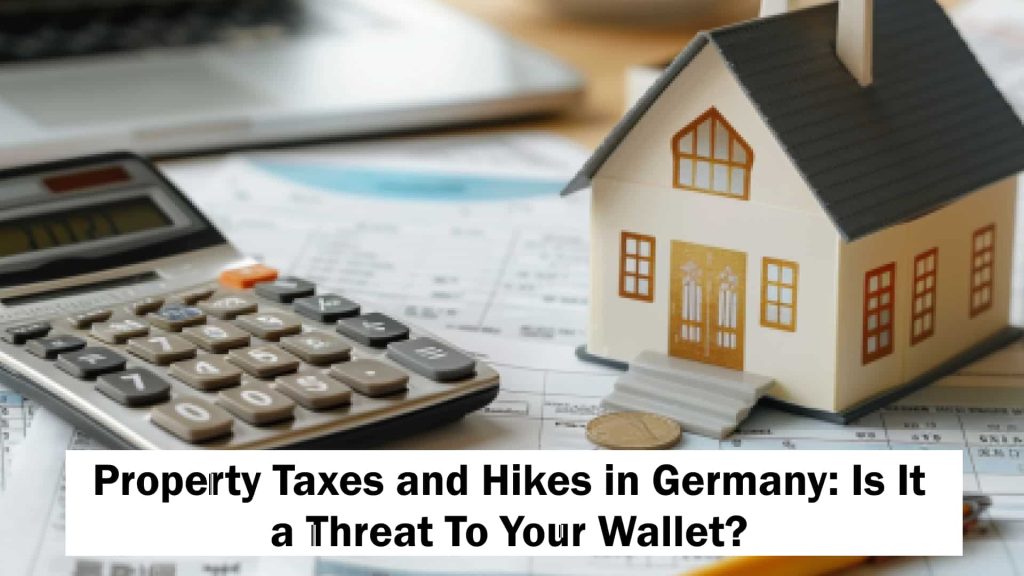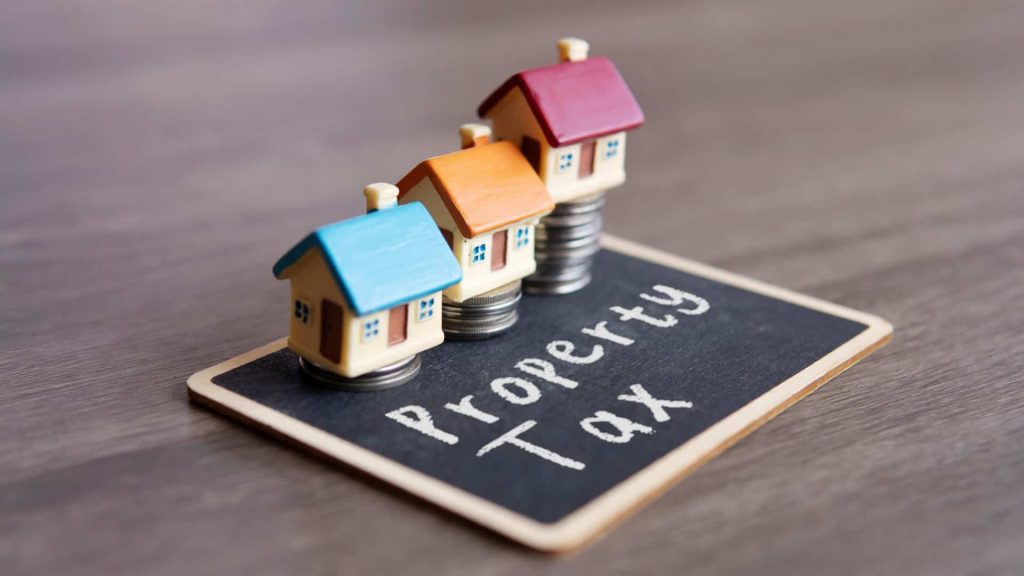
Are you a landowner in Germany?
Then, it’s important that you know the ins and outs of the property tax in Germany, also referred to as Grundsteuer in German. Essentially, it refers to the tax that is attributed to the ownership of land in Germany.
Here, we attempt to break down the complicated world of property tax in Germany, into simple, bite-sized chunks – delving into the what, why, where, when ., who, and how.
What is the Property Tax in Germany?

The property tax in Germany is called Grundsteuer. It’s a tax levied on the ownership of land and buildings. Unlike some countries, the tax is based on an assessed value rather than the current market value, which tends to be lower.
The property tax in Germany rate varies depending on the location (federal state) and the type of property (residential vs. commercial). It typically falls within a range of 0.26% to 1% of the assessed value.
Like most other taxes in Germany, the primary purpose of the property tax is to generate revenue for local governments. These funds are used to finance essential services and infrastructure projects like schools, libraries, roads, and public transportation. This ensures communities have the resources to maintain a high quality of life for residents.
Make sure to read: How to File Taxes in Germany?
The Impact of Property Tax in Germany
Property taxation, through the Grundsteuer system, like the VAT system, serves as a critical pillar of local government financing in Germany.

One of the key aspects for property tax is the concept of ‘benefit principle’. Property ownership is always seen as an indicator of benefiting from local services and infrastructure. Those with more valuable properties are likely to enjoy a greater level of benefit from these amenities. Property tax in Germany ensures a fair distribution of the financial burden for maintaining these services. Additionally, it is to be noted that property tax is deductible from rental income for landlords.
The Grundsteuer system plays a vital role in financing local government operations. It provides municipalities with a dependable source of income, granting them a degree of financial autonomy.
This allows local authorities to prioritise spending based on their specific needs and circumstances. For instance, a community with a growing population might allocate more resources toward building new schools, while another might focus on infrastructure upgrades.
Also read: 20 Unbelievably Long German Words for Simple Things
A Brief Breakdown of the System of Property Tax in Germany
As mentioned above, property tax in Germany is a levy imposed on the ownership of land and buildings. It forms a crucial part of Germany’s local government financing system, mandated by the Municipal Property Tax Act.

There are two main categories of Grundsteuer:
Grundsteuer A: Applies to agricultural and forestry properties. The tax rate for this category is uniform across Germany and based on a standard value, not the current market value.
Grundsteuer B: This category applies to residential and commercial properties. The tax rate for Grundsteuer B is set by individual municipalities and calculated based on an assessed value, which may differ from the market value due to periodic assessments.
The responsibility for paying Grundsteuer falls upon several entities: property owners, including homeowners, commercial property owners, and anyone else with legal ownership of the land or buildings; usufructuaries, who are individuals with the legal right to use and enjoy the benefits of a property, even if they don’t own it outright. Additionally, holders of heritable building rights, individuals may have the right to build on or develop a property without owning the land itself. These individuals are also liable for Grundsteuer.

We think you’ll love this: Everything You Need to Know About ‘Ruhezeit’ or the German Quiet Hours
How to Calculate Property Tax in Germany?
Calculating property tax in Germany has three essential components: assessed value, tax value, and multiplier.
Assessed Value is an estimated value assigned to the property by the tax authorities, usually based on valuations conducted years ago.
The tax office determines the assessed value based on factors like property type, size, location, and age. Since these assessments are not conducted frequently, they may not reflect significant changes in the market value.
Tax Rate is set by the federal government for Grundsteuer A (agricultural properties) and by individual municipalities for Grundsteuer B (residential and commercial properties). Rates typically range from 0.26% to 1%.

Municipalities have the authority to apply a multiplier to the assessed value before the tax rate is applied. This multiplier provides some flexibility for local governments to adjust the tax burden.
Essentially, the multiplier allows municipalities to influence the final tax amount within a certain range. A higher multiplier applied to the assessed value before the tax rate is applied will result in a higher Grundsteuer bill. Municipalities use this tool to adjust revenue generation based on local needs and priorities.
Property Tax Amount = Assessed Value x Multiplier x Tax Rate
Here’s an example of what the calculation will look like:
Let’s say, you own a residential property in a German city with a Grundsteuer B tax rate of 0.4%, and the assessed value of your property, determined by the tax office years ago, is €200,000. The municipality where your property is located applies a multiplier of 1.2 to all residential properties.
To calculate the adjusted assessed value, first, multiply the assessed value by the municipal multiplier:
€200,000 (assessed value) x 1.2 (multiplier) = €240,000 (adjusted assessed value).
Then, to find the property tax amount, multiply the adjusted assessed value by the tax rate:
€240,000 (adjusted assessed value) x 0.004 (tax rate) = €960 (Grundsteuer amount).
| Property Type | Base Tax Rate Range (%) | Example Municipal Multipliers | Effective Property Tax Rate Range (%)* |
|---|---|---|---|
| Residential (Single-Family Home) | 0.26 – 0.35 | 300% – 700% | 0.78% – 2.45% |
| Residential (Multi-Family Home) | 0.31 – 0.35 | 300% – 700% | 0.93% – 2.45% |
| Commercial | 0.35 – 1.00 | 300% – 700% | 1.05% – 7.00% |
| Undeveloped Land | 0.60 – 0.95 | 300% – 700% | 1.80% – 6.65% |
Don’t forget to read: How to Apply for Scholarships to Study in Germany?
What is the Payment Process for Property Tax in Germany?
Grundsteuer payment is typically a straightforward process handled by local municipalities. Usually, the payment and billing happen at regular intervals. Property owners typically receive assessment notices once or twice a year detailing the amount owed and the due date(s).
These notices are sent by the local municipality responsible for administering Grundsteuer in your area.
Local tax offices also have a crucial role to play in this process. They handle property valuations (though valuations themselves may not be frequent), calculate tax amounts based on the assessment and tax rate, and issue assessment notices to property owners.
It’s important to remember that late payments are often frowned upon and can result in penalties and interest charges.
Challenges and Considerations For Property Owners in Germany
Like any administrative system, there are some challenges and considerations for the property tax system in Germany as well. Please do note that all of these are likely outcomes and mistakes when it comes to property taxes, but it’s not necessary that it should happen to you.

Since assessments may not be conducted frequently, property taxes might not reflect current market values, which is also referred to as outdated valuations. This can be a burden for owners, especially if property values have risen considerably.
High Grundsteuer is another important factor when considering property investments. Potential investors may be discouraged by ongoing property taxes, which can impact the overall attractiveness of a particular property or location.
How to Contest a Property Tax Assessment in Germany?
In Germany, contesting a property tax assessment involves an administrative procedure before resorting to court.
- Deadline: Act quickly! You generally have one month from the receipt of the tax assessment notice to file an objection. This period starts three days after the notice arrives (excluding Sundays and public holidays).
- Objection: You can submit an objection to the same tax office that issued the assessment. It can be done in writing or by visiting the office in person.
- Justification: You have two months from the initial objection deadline to submit a detailed justification for contesting the assessment to present evidence supporting your claim.
- Review: The tax office will review your objection and justification. They may request additional information or propose an adjustment to the assessment. If the tax office agrees with your objection, they will amend the assessment. If not, they will issue a rejection notice.
- Court Action: If the objection is rejected, you can then file a lawsuit with the Fiscal Court within one month of receiving the rejection notice.
New Property Tax Reform (2025) in Germany
In January 2022, a snapshot was taken of the value of nearly 36 million properties across the country. This serves as the baseline for the new tax rates. Everyone who owned land (developed or undeveloped), a condo, or an agricultural/forestry business on that date had to file a property tax return between July and October 2022.
Tax offices will crunch the numbers and determine new property tax amounts by the end of 2023. This information will then be passed on to municipalities, who will set the actual tax rates by December 2024. The new system with updated valuations won’t take effect until 2025. To ensure the system stays current, properties will be revalued every seven years.
Your recommended post for the week: The Essential Role of ‘Ordnungsamt’ in Local Neighborhoods
We understand that the property tax in Germany adds another layer of complexity to the number of taxes you need to pay. However, property taxes are an important aspect of public administration, especially for maintaining and promoting measures of public welfare and facilities.
However, if you want to avoid the complications related to owning property and building in Germany, but still want to make a home for yourself and your family in this beautiful country, consider checking out the rental, fully-furnished apartments offered by Urban Ground.
Disclaimer:
The information contained in this Urban Ground blog post is for informational purposes only and does not constitute financial or legal advice. Please consult with a qualified professional for advice specific to your situation. For more information on Grundsteuer, please visit the official website of the German Federal Ministry of Finance.




